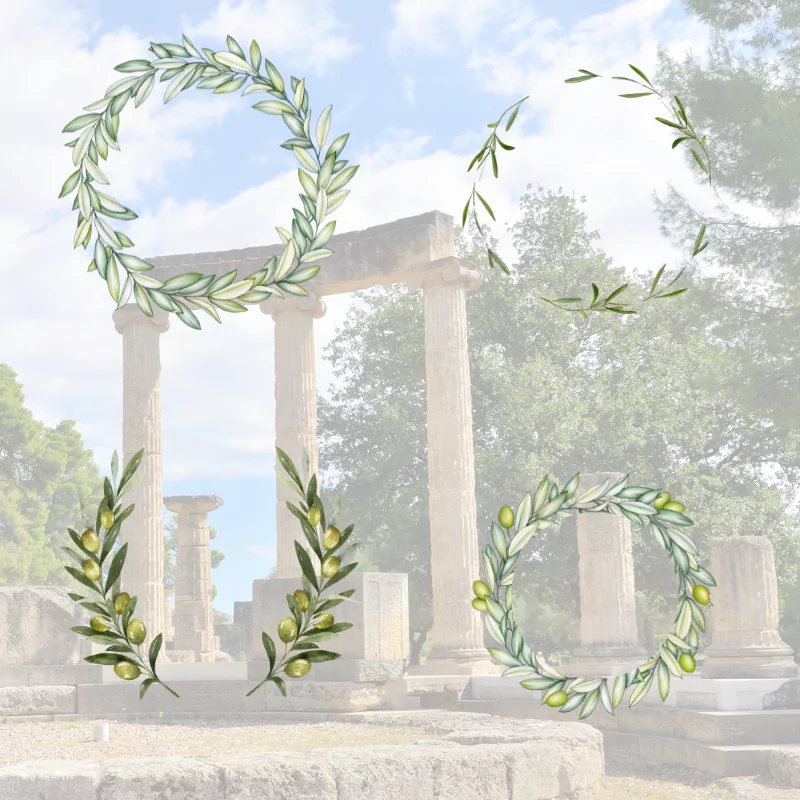Table of Contents
Origin and Significance of Olive Wreaths
In ancient Olympia, amidst the cheers of the crowds and the feats of the athletes, the olive wreath emerged as a symbol of triumph and honor. This simple, yet profound symbol encapsulates the spirit of the Olympic Games, representing victory, peace, and the sacred connection to the land.
The Kotinos: A Sacred Symbol
The olive wreath, known as the kotinos, was made from the wild olive tree, or “kallistephanos,” near the temple of Zeus in Olympia. According to legend, it was Hercules who first laid out the Olympic track and planted the sacred olive tree from which the wreaths were made. The wreath was not just a prize; it was a sacred offering, imbued with cultural and religious significance.
More Than Just a Prize
Winning an olive wreath at Olympia was one of the highest honors for an ancient athlete. Unlike modern medals, these wreaths held no intrinsic monetary value. Instead, they represented the glory of victory and the respect of one’s peers. The wreath was a testament to the athlete’s physical prowess, dedication, and the favor of the gods.
The Process of Making and Awarding Wreaths
The creation and awarding of the olive wreaths in ancient Olympia were processes steeped in tradition and symbolism.
Crafting the Kotinos
The process of making an olive wreath was a task of precision and reverence. Before the commencement of the games, a special ceremony was held where the Hellanodikai (judges of the games) would cut branches from the sacred olive tree with a golden sickle. The branches were then carefully woven into wreaths, ensuring that each one was a perfect circle, symbolizing unity and eternity.
The Award Ceremony
The climax of the Olympic Games was the award ceremony, where victors were crowned with olive wreaths. This momentous occasion took place within the sanctuary of Zeus, adding a divine dimension to the athletes’ triumph. The ceremony was not just an athletic celebration but a religious and cultural festival, attended by thousands, including dignitaries and priests.

Symbolism in Greek Culture and Mythology
The olive wreath, or kotinos, was more than a mere decorative item in ancient Greece; it was steeped in cultural and mythological significance, resonating with deep symbolic meanings.
The Olive Tree in Greek Mythology
The olive tree held a special place in Greek mythology. According to legend, it was Athena who gifted the olive tree to the city of Athens, winning the favor of its people over Poseidon. This myth underscores the olive tree’s significance as a symbol of wisdom, peace, and prosperity.
The Wreath as a Symbol of Peace and Victory
The kotinos was not only a symbol of athletic victory but also of peace. The olive branch has traditionally been associated with peace and reconciliation, and its use in the wreaths at Olympia further emphasized the Olympic Truce, during which conflicts were suspended, and unity was celebrated.
Famous Victors Who Received Olive Wreaths
Over the centuries, numerous athletes achieved glory in the Olympic Games and were honored with olive wreaths. Their victories became part of the rich tapestry of Greek history and legend.
Celebrated Olympians
Athletes like Diagoras of Rhodes, who won twelve crowns in the Olympics, and Milo of Croton, a renowned wrestler, were among those who received this prestigious honor. Their victories, celebrated with olive wreaths, elevated them to a near-mythical status, immortalizing their names in the annals of history.
Olive Wreaths in Modern Olympic Symbolism
The tradition of the olive wreath has transcended ancient Greek borders and times, finding its place in the modern Olympic Games.
The Continuation of a Timeless Tradition
In the modern Olympics, while gold, silver, and bronze medals are awarded, the olive wreath still appears in various symbolic forms. It is often seen in logos, emblems, and the ceremonial aspects of the games, serving as a link to the ancient traditions and a reminder of the Olympic Games’ historical roots.
A Universal Symbol of Excellence
Today, the olive wreath represents the universal ideals of excellence, peace, and unity that the Olympic Games aspire to promote. It is a symbol that resonates across cultures and times, embodying the enduring spirit of the Olympics.
Conclusion
The olive wreaths of Olympia stand as a testament to ancient Greek values, a symbol of victory, peace, and cultural heritage. Their legacy continues in the modern world, bridging the ancient and contemporary, and reminding us of the timeless pursuit of excellence and harmony. The kotinos, simple yet profound, remains an enduring icon of the Olympic spirit.

